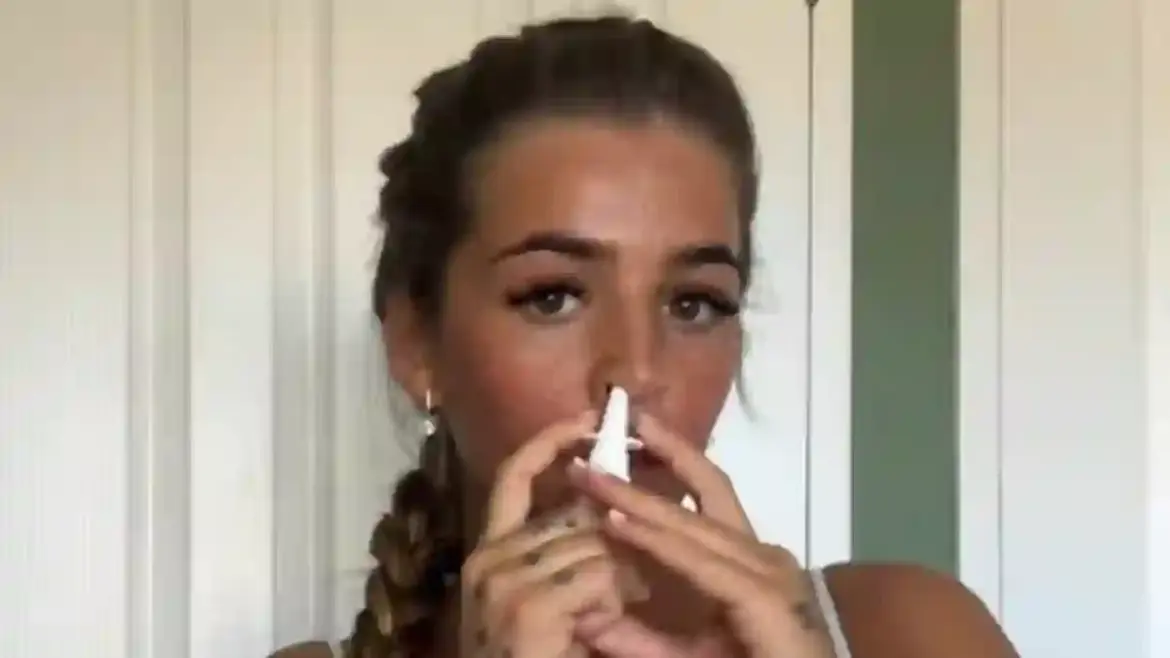It started with a simple TikTok video: a young woman in her twenties flashing a bright smile as she demonstrates her “tan routine.”
But behind the playful poses and heart emojis lies a hidden danger.
The routine isn’t about lounging in the sun or applying a fake tan—it involves inhaling a mysterious amber liquid through her nose, a practice that experts warn could be extremely harmful.
Nasal Tanning Sprays Are the New Trend
In her video, she walks into a sunbed shop, documents her session, and proudly displays the dramatic contrast between her tanned skin and pale complexion.
Captioned, “My tan routine [heart emoji] everyone always asks how I’m so tanned,” the clip has racked up over 21,000 likes on TikTok.
Curious viewers flooded the comments, asking about the brand of nasal tan-enhancing spray she was using.
Search #sunbed on TikTok, and you’ll see countless similar videos, showing a growing trend among young women combining sunbeds with nasal sprays—and sometimes even injections—containing synthetic hormones to intensify their tan.
The Science Behind the Spray
Many of these sprays contain melanotan II, a synthetic compound that mimics a naturally occurring hormone called melanocyte-stimulating hormone (MSH).
MSH triggers melanin production when the skin is exposed to UV light, which darkens the skin.
Nasal sprays or injections of melanotan II essentially fool the body into producing more pigment, producing a darker tan without sun exposure.
Pearl Koster, 22, from Surrey, shared her experience on TikTok, admitting she spends £50 a week on sunbeds and uses a nasal spray she mistakenly called “melatonin.”
“No one really knows what’s in these things,” she laughs, “everyone corrected me in the comments.”
Rising Popularity Despite Risks
Although sunbeds were banned for under-18s in 2010 and tanning shops declined sharply by 2013 due to health risks, usage is climbing again.
A recent study from Melanoma Focus found that 42 percent of 18 to 25-year-olds have used sunbeds, with many supplementing them with unregulated sprays or injections.
Melanotan II has never been approved for cosmetic use in the UK and is illegal to sell.
Experts warn of potential side effects, including respiratory problems, nausea, high blood pressure, changes to moles, kidney issues, and links to skin cancer.
Long-term effects remain largely unknown.
Tragic Consequences
The dangers are not just theoretical. Paige Phillips, a young tanning addict, combined nasal sprays with sunbeds and developed a rare melanoma in her mouth.
By the age of 24, the cancer had spread to her neck, lungs, and brain, ultimately claiming her life.
Her story serves as a chilling warning of the risks these products pose.
The Ease of Access Makes It Worse
Pearl admits she was drawn to nasal sprays because of their convenience.
Products are marketed with sweet flavors like watermelon or bubblegum and can be purchased as easily as a mascara via TikTok Shop.
Many come with vague instructions and no list of ingredients, leaving users unaware of the real dangers.
A test order revealed a small glass vial filled with white crystals and instructions to inject oneself—highlighting how casual these risky products have become.
Dermatologists warn that inhaling or injecting unregulated chemicals can lead to allergic reactions, airway issues, premature skin aging, and increased cancer risk.
TikTok’s Role and Regulatory Gaps
Despite TikTok’s policies against promoting unlicensed drugs, sellers continue to post videos promoting nasal sprays and injections.
Regulatory agencies like the MHRA struggle to police these products, especially when sellers operate from abroad.
Nasal sprays fall into a gray area between medical and cosmetic products, making enforcement difficult.
Experts Warn of a Potential Crisis
Dr. Catherine Borysiewicz, a consultant dermatologist, warns that the growing popularity of these products could lead to a “complete crisis” of young people damaging their skin and health in pursuit of a perfect tan.
“I think every dermatologist hopes they’ll be banned, along with sunbeds,” she says.
A Cautionary Tale
As summer fades and young people seek to maintain their glow, t
he allure of quick-fix tanning sprays and injections remains strong. But the risks are clear, and the consequences could be devastating.
Stories like Paige’s serve as a stark reminder: chasing a tan at any cost can have life-threatening consequences.



